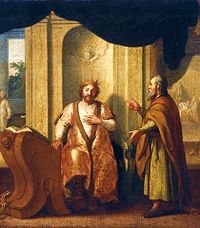Nathan (prophet)

- For other biblical people with this name, see Nathan (given name).
Nathan (Template:Lang-he Nāṯan; Template:Lang-syr fl. c. 1000 BC) is a person in the Hebrew Bible.
His actions are described in the Books of Samuel, Kings, and Chronicles (especially 2 Samuel 7:2–17, 12:1–25).
According to 2 Samuel, he was a court prophet who lived in the time of King David. He announced to David the covenant God was making with him (2 Samuel 7:4–17, a passage known as Nathan's Oracle),[1] contrasting David's proposal to build a house (i.e. a building) for the Ark of the Covenant with God's plan to build a house (i.e. a dynasty) for David. Later, he came to David to reprimand him for committing adultery with Bathsheba while she was the wife of Uriah the Hittite, whose death the King had also arranged to hide his previous transgression (2 Samuel 12:7–14).
According to Chronicles, Nathan wrote histories of the reigns of both David (1 Chronicles 29:29) and Solomon (2 Chronicles 9:29), and was involved in the music of the temple (see 2 Chronicles 29:25).
In 1 Kings 1:8–45 it is Nathan who tells the dying David of the plot of Adonijah to become king, resulting in Solomon being proclaimed king instead. Nathan presides at the anointing of King Solomon, and his name appears in Handel's coronation anthem "Zadok the Priest".
The feast day of Nathan the Prophet is on 24 October. In the Eastern Orthodox Church, and those Eastern Catholic Churches which follow the Byzantine Rite, he is commemorated as a saint on the Sunday of the Holy Fathers (i.e., the Sunday before the Great Feast of the Nativity of the Lord).
References
- ^ The Composition of Nathan's Oracle to David (2 Samuel 7:1-17) as a Reflection of Royal Judahite Ideology, Journal of Biblical Literature, Vol. 129, No. 2 (Summer 2010), pp. 261-279, accessed 15 July 2017
See also
External links
- Sunday of the Holy Fathers Orthodox synaxarion
